PERSONAL FINANCIAL MANAGEMENT.
VerifiedAdded on 2023/04/07
|17
|3280
|206
AI Summary
Contribute Materials
Your contribution can guide someone’s learning journey. Share your
documents today.
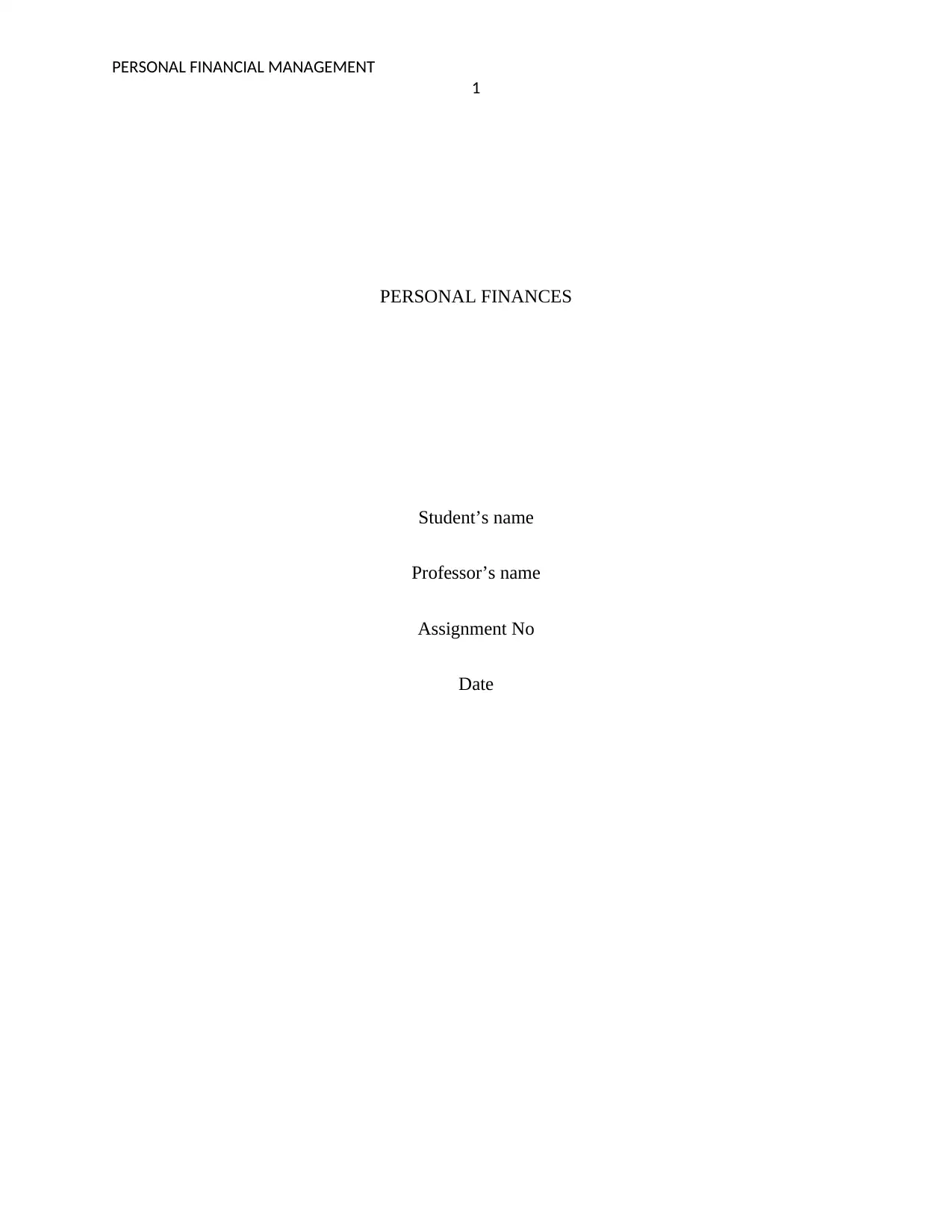
PERSONAL FINANCIAL MANAGEMENT
1
PERSONAL FINANCES
Student’s name
Professor’s name
Assignment No
Date
1
PERSONAL FINANCES
Student’s name
Professor’s name
Assignment No
Date
Secure Best Marks with AI Grader
Need help grading? Try our AI Grader for instant feedback on your assignments.
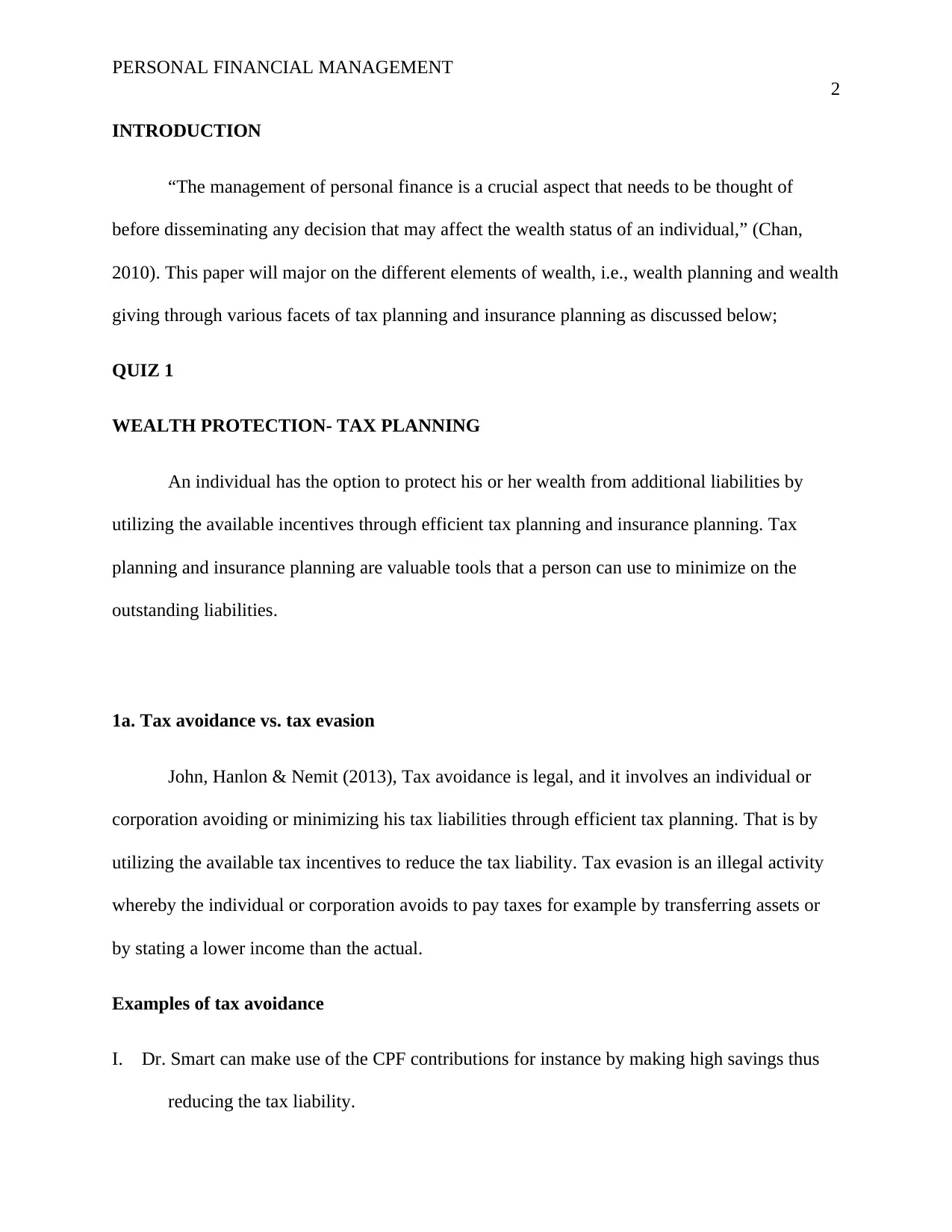
PERSONAL FINANCIAL MANAGEMENT
2
INTRODUCTION
“The management of personal finance is a crucial aspect that needs to be thought of
before disseminating any decision that may affect the wealth status of an individual,” (Chan,
2010). This paper will major on the different elements of wealth, i.e., wealth planning and wealth
giving through various facets of tax planning and insurance planning as discussed below;
QUIZ 1
WEALTH PROTECTION- TAX PLANNING
An individual has the option to protect his or her wealth from additional liabilities by
utilizing the available incentives through efficient tax planning and insurance planning. Tax
planning and insurance planning are valuable tools that a person can use to minimize on the
outstanding liabilities.
1a. Tax avoidance vs. tax evasion
John, Hanlon & Nemit (2013), Tax avoidance is legal, and it involves an individual or
corporation avoiding or minimizing his tax liabilities through efficient tax planning. That is by
utilizing the available tax incentives to reduce the tax liability. Tax evasion is an illegal activity
whereby the individual or corporation avoids to pay taxes for example by transferring assets or
by stating a lower income than the actual.
Examples of tax avoidance
I. Dr. Smart can make use of the CPF contributions for instance by making high savings thus
reducing the tax liability.
2
INTRODUCTION
“The management of personal finance is a crucial aspect that needs to be thought of
before disseminating any decision that may affect the wealth status of an individual,” (Chan,
2010). This paper will major on the different elements of wealth, i.e., wealth planning and wealth
giving through various facets of tax planning and insurance planning as discussed below;
QUIZ 1
WEALTH PROTECTION- TAX PLANNING
An individual has the option to protect his or her wealth from additional liabilities by
utilizing the available incentives through efficient tax planning and insurance planning. Tax
planning and insurance planning are valuable tools that a person can use to minimize on the
outstanding liabilities.
1a. Tax avoidance vs. tax evasion
John, Hanlon & Nemit (2013), Tax avoidance is legal, and it involves an individual or
corporation avoiding or minimizing his tax liabilities through efficient tax planning. That is by
utilizing the available tax incentives to reduce the tax liability. Tax evasion is an illegal activity
whereby the individual or corporation avoids to pay taxes for example by transferring assets or
by stating a lower income than the actual.
Examples of tax avoidance
I. Dr. Smart can make use of the CPF contributions for instance by making high savings thus
reducing the tax liability.
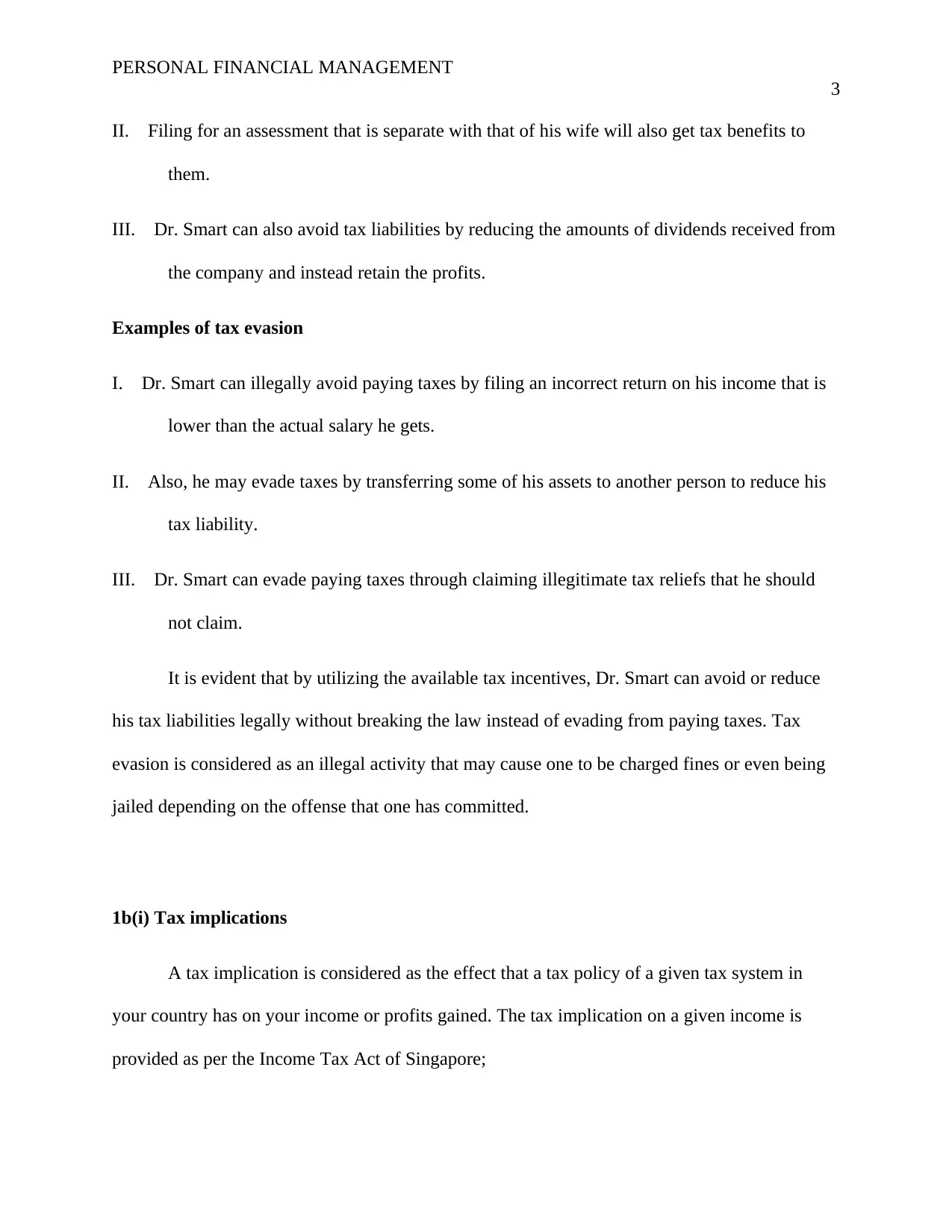
PERSONAL FINANCIAL MANAGEMENT
3
II. Filing for an assessment that is separate with that of his wife will also get tax benefits to
them.
III. Dr. Smart can also avoid tax liabilities by reducing the amounts of dividends received from
the company and instead retain the profits.
Examples of tax evasion
I. Dr. Smart can illegally avoid paying taxes by filing an incorrect return on his income that is
lower than the actual salary he gets.
II. Also, he may evade taxes by transferring some of his assets to another person to reduce his
tax liability.
III. Dr. Smart can evade paying taxes through claiming illegitimate tax reliefs that he should
not claim.
It is evident that by utilizing the available tax incentives, Dr. Smart can avoid or reduce
his tax liabilities legally without breaking the law instead of evading from paying taxes. Tax
evasion is considered as an illegal activity that may cause one to be charged fines or even being
jailed depending on the offense that one has committed.
1b(i) Tax implications
A tax implication is considered as the effect that a tax policy of a given tax system in
your country has on your income or profits gained. The tax implication on a given income is
provided as per the Income Tax Act of Singapore;
3
II. Filing for an assessment that is separate with that of his wife will also get tax benefits to
them.
III. Dr. Smart can also avoid tax liabilities by reducing the amounts of dividends received from
the company and instead retain the profits.
Examples of tax evasion
I. Dr. Smart can illegally avoid paying taxes by filing an incorrect return on his income that is
lower than the actual salary he gets.
II. Also, he may evade taxes by transferring some of his assets to another person to reduce his
tax liability.
III. Dr. Smart can evade paying taxes through claiming illegitimate tax reliefs that he should
not claim.
It is evident that by utilizing the available tax incentives, Dr. Smart can avoid or reduce
his tax liabilities legally without breaking the law instead of evading from paying taxes. Tax
evasion is considered as an illegal activity that may cause one to be charged fines or even being
jailed depending on the offense that one has committed.
1b(i) Tax implications
A tax implication is considered as the effect that a tax policy of a given tax system in
your country has on your income or profits gained. The tax implication on a given income is
provided as per the Income Tax Act of Singapore;
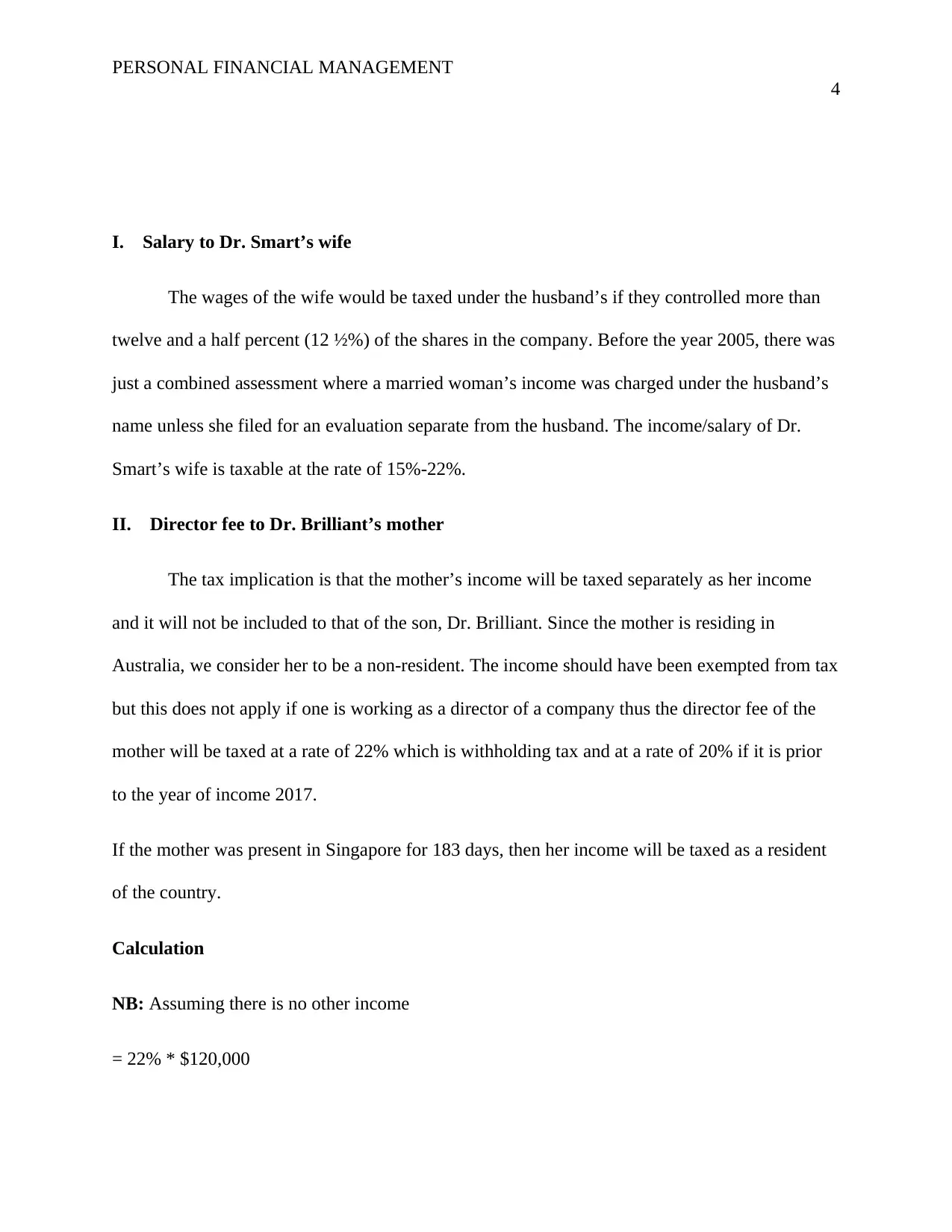
PERSONAL FINANCIAL MANAGEMENT
4
I. Salary to Dr. Smart’s wife
The wages of the wife would be taxed under the husband’s if they controlled more than
twelve and a half percent (12 ½%) of the shares in the company. Before the year 2005, there was
just a combined assessment where a married woman’s income was charged under the husband’s
name unless she filed for an evaluation separate from the husband. The income/salary of Dr.
Smart’s wife is taxable at the rate of 15%-22%.
II. Director fee to Dr. Brilliant’s mother
The tax implication is that the mother’s income will be taxed separately as her income
and it will not be included to that of the son, Dr. Brilliant. Since the mother is residing in
Australia, we consider her to be a non-resident. The income should have been exempted from tax
but this does not apply if one is working as a director of a company thus the director fee of the
mother will be taxed at a rate of 22% which is withholding tax and at a rate of 20% if it is prior
to the year of income 2017.
If the mother was present in Singapore for 183 days, then her income will be taxed as a resident
of the country.
Calculation
NB: Assuming there is no other income
= 22% * $120,000
4
I. Salary to Dr. Smart’s wife
The wages of the wife would be taxed under the husband’s if they controlled more than
twelve and a half percent (12 ½%) of the shares in the company. Before the year 2005, there was
just a combined assessment where a married woman’s income was charged under the husband’s
name unless she filed for an evaluation separate from the husband. The income/salary of Dr.
Smart’s wife is taxable at the rate of 15%-22%.
II. Director fee to Dr. Brilliant’s mother
The tax implication is that the mother’s income will be taxed separately as her income
and it will not be included to that of the son, Dr. Brilliant. Since the mother is residing in
Australia, we consider her to be a non-resident. The income should have been exempted from tax
but this does not apply if one is working as a director of a company thus the director fee of the
mother will be taxed at a rate of 22% which is withholding tax and at a rate of 20% if it is prior
to the year of income 2017.
If the mother was present in Singapore for 183 days, then her income will be taxed as a resident
of the country.
Calculation
NB: Assuming there is no other income
= 22% * $120,000
Secure Best Marks with AI Grader
Need help grading? Try our AI Grader for instant feedback on your assignments.
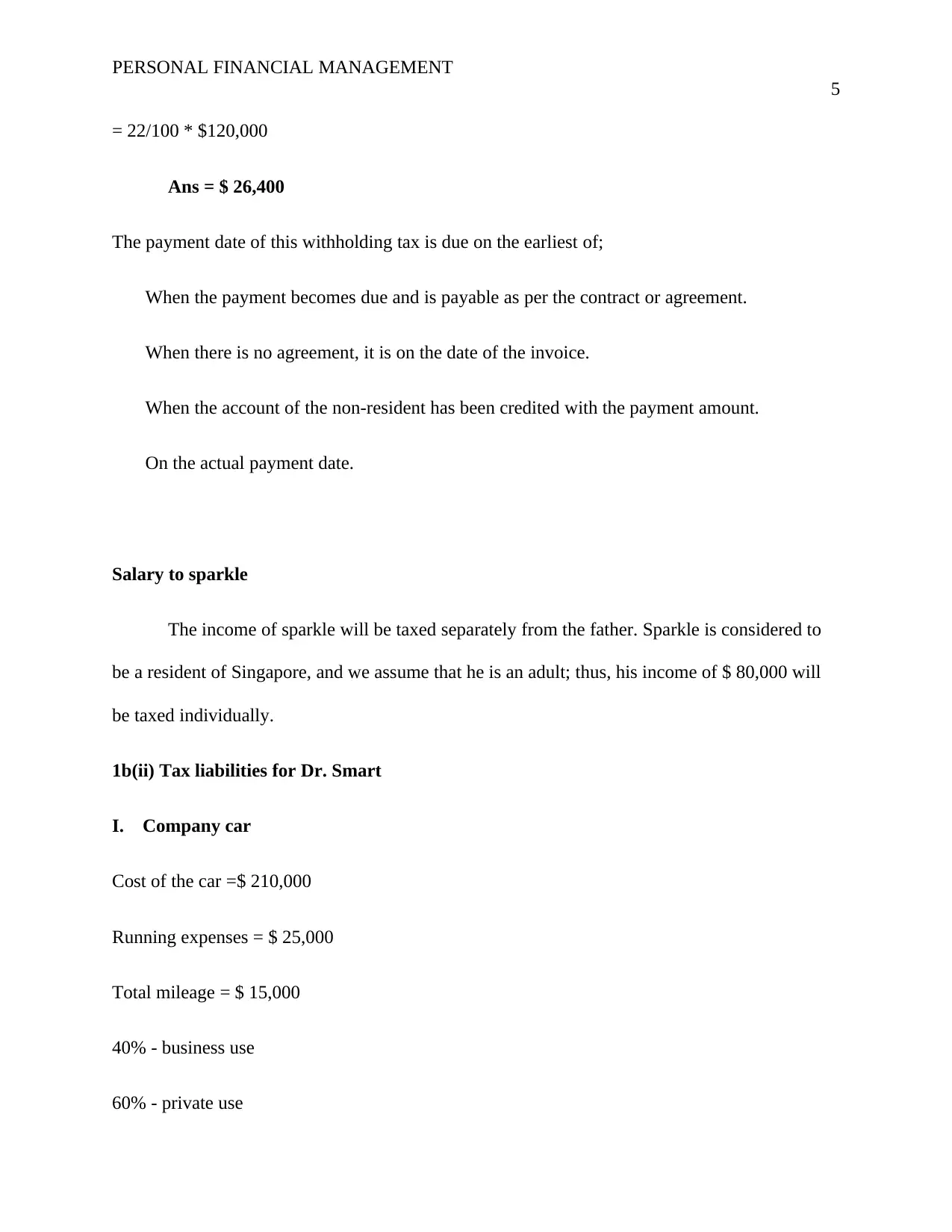
PERSONAL FINANCIAL MANAGEMENT
5
= 22/100 * $120,000
Ans = $ 26,400
The payment date of this withholding tax is due on the earliest of;
When the payment becomes due and is payable as per the contract or agreement.
When there is no agreement, it is on the date of the invoice.
When the account of the non-resident has been credited with the payment amount.
On the actual payment date.
Salary to sparkle
The income of sparkle will be taxed separately from the father. Sparkle is considered to
be a resident of Singapore, and we assume that he is an adult; thus, his income of $ 80,000 will
be taxed individually.
1b(ii) Tax liabilities for Dr. Smart
I. Company car
Cost of the car =$ 210,000
Running expenses = $ 25,000
Total mileage = $ 15,000
40% - business use
60% - private use
5
= 22/100 * $120,000
Ans = $ 26,400
The payment date of this withholding tax is due on the earliest of;
When the payment becomes due and is payable as per the contract or agreement.
When there is no agreement, it is on the date of the invoice.
When the account of the non-resident has been credited with the payment amount.
On the actual payment date.
Salary to sparkle
The income of sparkle will be taxed separately from the father. Sparkle is considered to
be a resident of Singapore, and we assume that he is an adult; thus, his income of $ 80,000 will
be taxed individually.
1b(ii) Tax liabilities for Dr. Smart
I. Company car
Cost of the car =$ 210,000
Running expenses = $ 25,000
Total mileage = $ 15,000
40% - business use
60% - private use
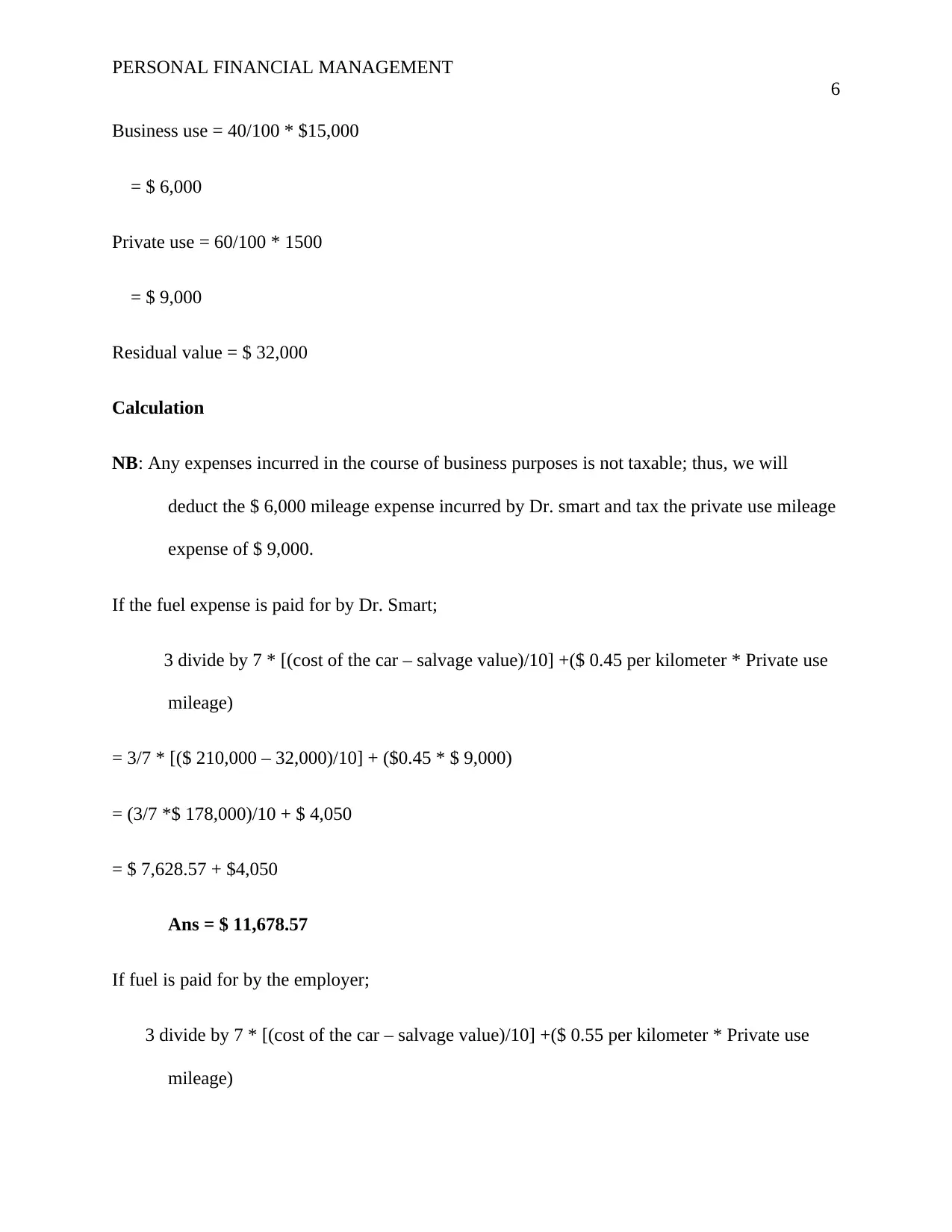
PERSONAL FINANCIAL MANAGEMENT
6
Business use = 40/100 * $15,000
= $ 6,000
Private use = 60/100 * 1500
= $ 9,000
Residual value = $ 32,000
Calculation
NB: Any expenses incurred in the course of business purposes is not taxable; thus, we will
deduct the $ 6,000 mileage expense incurred by Dr. smart and tax the private use mileage
expense of $ 9,000.
If the fuel expense is paid for by Dr. Smart;
3 divide by 7 * [(cost of the car – salvage value)/10] +($ 0.45 per kilometer * Private use
mileage)
= 3/7 * [($ 210,000 – 32,000)/10] + ($0.45 * $ 9,000)
= (3/7 *$ 178,000)/10 + $ 4,050
= $ 7,628.57 + $4,050
Ans = $ 11,678.57
If fuel is paid for by the employer;
3 divide by 7 * [(cost of the car – salvage value)/10] +($ 0.55 per kilometer * Private use
mileage)
6
Business use = 40/100 * $15,000
= $ 6,000
Private use = 60/100 * 1500
= $ 9,000
Residual value = $ 32,000
Calculation
NB: Any expenses incurred in the course of business purposes is not taxable; thus, we will
deduct the $ 6,000 mileage expense incurred by Dr. smart and tax the private use mileage
expense of $ 9,000.
If the fuel expense is paid for by Dr. Smart;
3 divide by 7 * [(cost of the car – salvage value)/10] +($ 0.45 per kilometer * Private use
mileage)
= 3/7 * [($ 210,000 – 32,000)/10] + ($0.45 * $ 9,000)
= (3/7 *$ 178,000)/10 + $ 4,050
= $ 7,628.57 + $4,050
Ans = $ 11,678.57
If fuel is paid for by the employer;
3 divide by 7 * [(cost of the car – salvage value)/10] +($ 0.55 per kilometer * Private use
mileage)
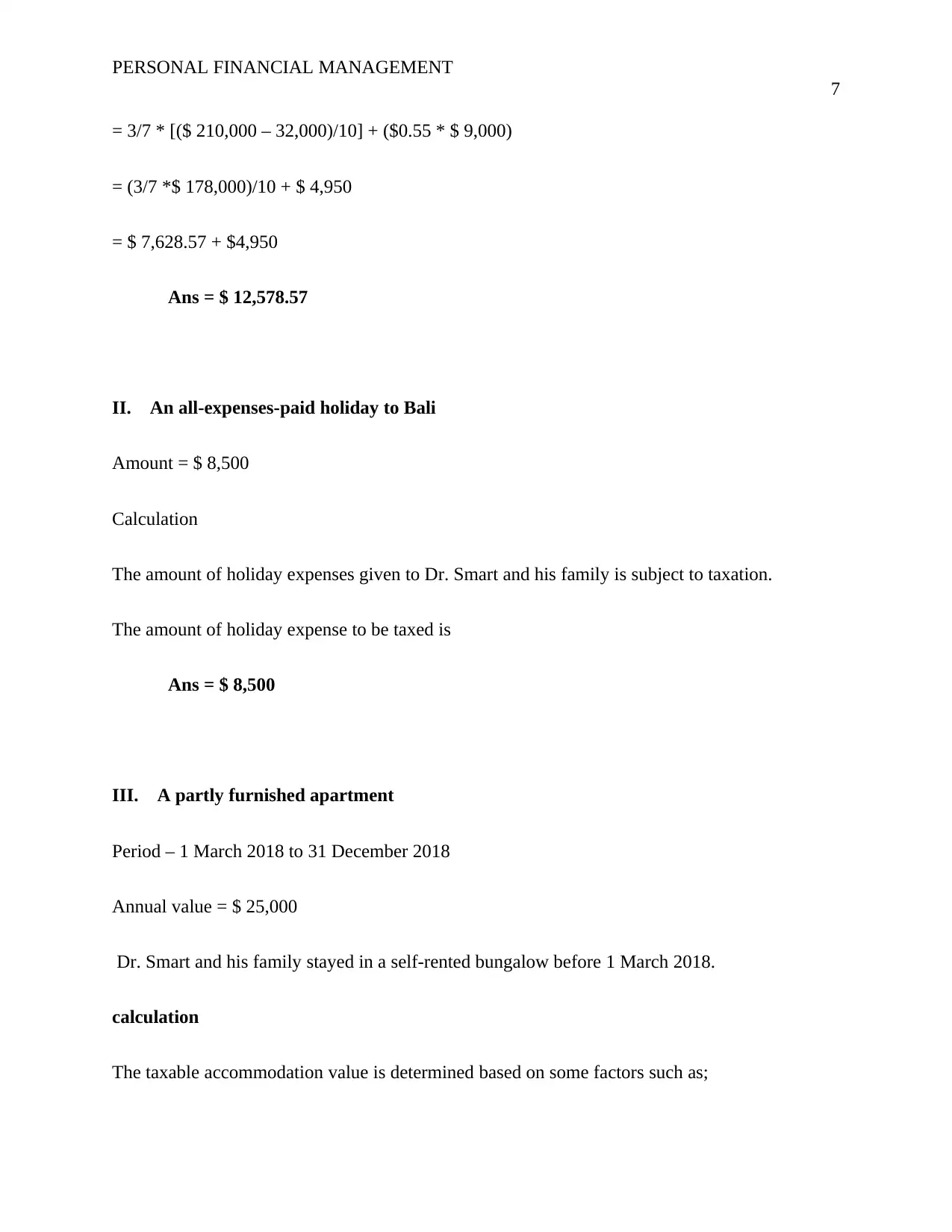
PERSONAL FINANCIAL MANAGEMENT
7
= 3/7 * [($ 210,000 – 32,000)/10] + ($0.55 * $ 9,000)
= (3/7 *$ 178,000)/10 + $ 4,950
= $ 7,628.57 + $4,950
Ans = $ 12,578.57
II. An all-expenses-paid holiday to Bali
Amount = $ 8,500
Calculation
The amount of holiday expenses given to Dr. Smart and his family is subject to taxation.
The amount of holiday expense to be taxed is
Ans = $ 8,500
III. A partly furnished apartment
Period – 1 March 2018 to 31 December 2018
Annual value = $ 25,000
Dr. Smart and his family stayed in a self-rented bungalow before 1 March 2018.
calculation
The taxable accommodation value is determined based on some factors such as;
7
= 3/7 * [($ 210,000 – 32,000)/10] + ($0.55 * $ 9,000)
= (3/7 *$ 178,000)/10 + $ 4,950
= $ 7,628.57 + $4,950
Ans = $ 12,578.57
II. An all-expenses-paid holiday to Bali
Amount = $ 8,500
Calculation
The amount of holiday expenses given to Dr. Smart and his family is subject to taxation.
The amount of holiday expense to be taxed is
Ans = $ 8,500
III. A partly furnished apartment
Period – 1 March 2018 to 31 December 2018
Annual value = $ 25,000
Dr. Smart and his family stayed in a self-rented bungalow before 1 March 2018.
calculation
The taxable accommodation value is determined based on some factors such as;
Paraphrase This Document
Need a fresh take? Get an instant paraphrase of this document with our AI Paraphraser
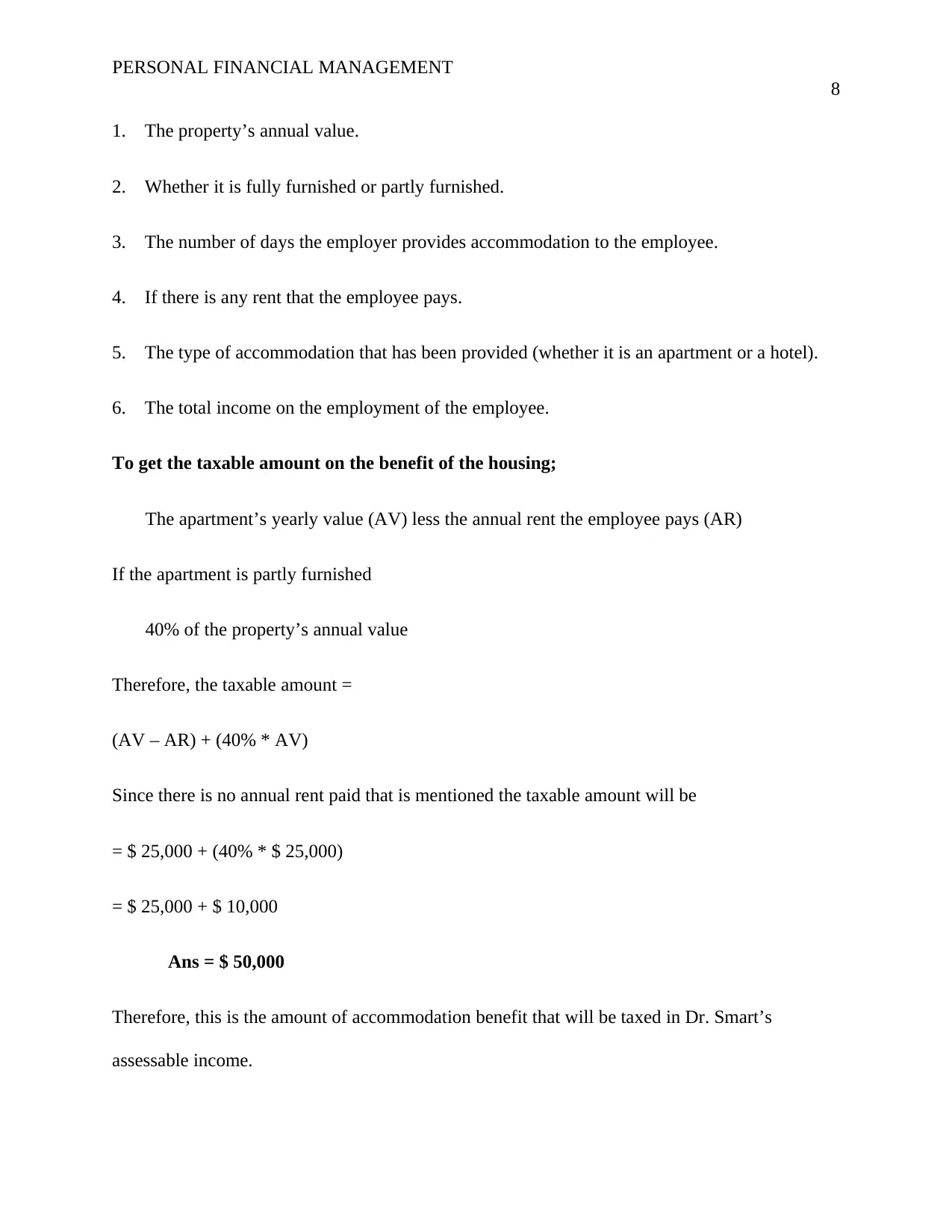
PERSONAL FINANCIAL MANAGEMENT
8
1. The property’s annual value.
2. Whether it is fully furnished or partly furnished.
3. The number of days the employer provides accommodation to the employee.
4. If there is any rent that the employee pays.
5. The type of accommodation that has been provided (whether it is an apartment or a hotel).
6. The total income on the employment of the employee.
To get the taxable amount on the benefit of the housing;
The apartment’s yearly value (AV) less the annual rent the employee pays (AR)
If the apartment is partly furnished
40% of the property’s annual value
Therefore, the taxable amount =
(AV – AR) + (40% * AV)
Since there is no annual rent paid that is mentioned the taxable amount will be
= $ 25,000 + (40% * $ 25,000)
= $ 25,000 + $ 10,000
Ans = $ 50,000
Therefore, this is the amount of accommodation benefit that will be taxed in Dr. Smart’s
assessable income.
8
1. The property’s annual value.
2. Whether it is fully furnished or partly furnished.
3. The number of days the employer provides accommodation to the employee.
4. If there is any rent that the employee pays.
5. The type of accommodation that has been provided (whether it is an apartment or a hotel).
6. The total income on the employment of the employee.
To get the taxable amount on the benefit of the housing;
The apartment’s yearly value (AV) less the annual rent the employee pays (AR)
If the apartment is partly furnished
40% of the property’s annual value
Therefore, the taxable amount =
(AV – AR) + (40% * AV)
Since there is no annual rent paid that is mentioned the taxable amount will be
= $ 25,000 + (40% * $ 25,000)
= $ 25,000 + $ 10,000
Ans = $ 50,000
Therefore, this is the amount of accommodation benefit that will be taxed in Dr. Smart’s
assessable income.
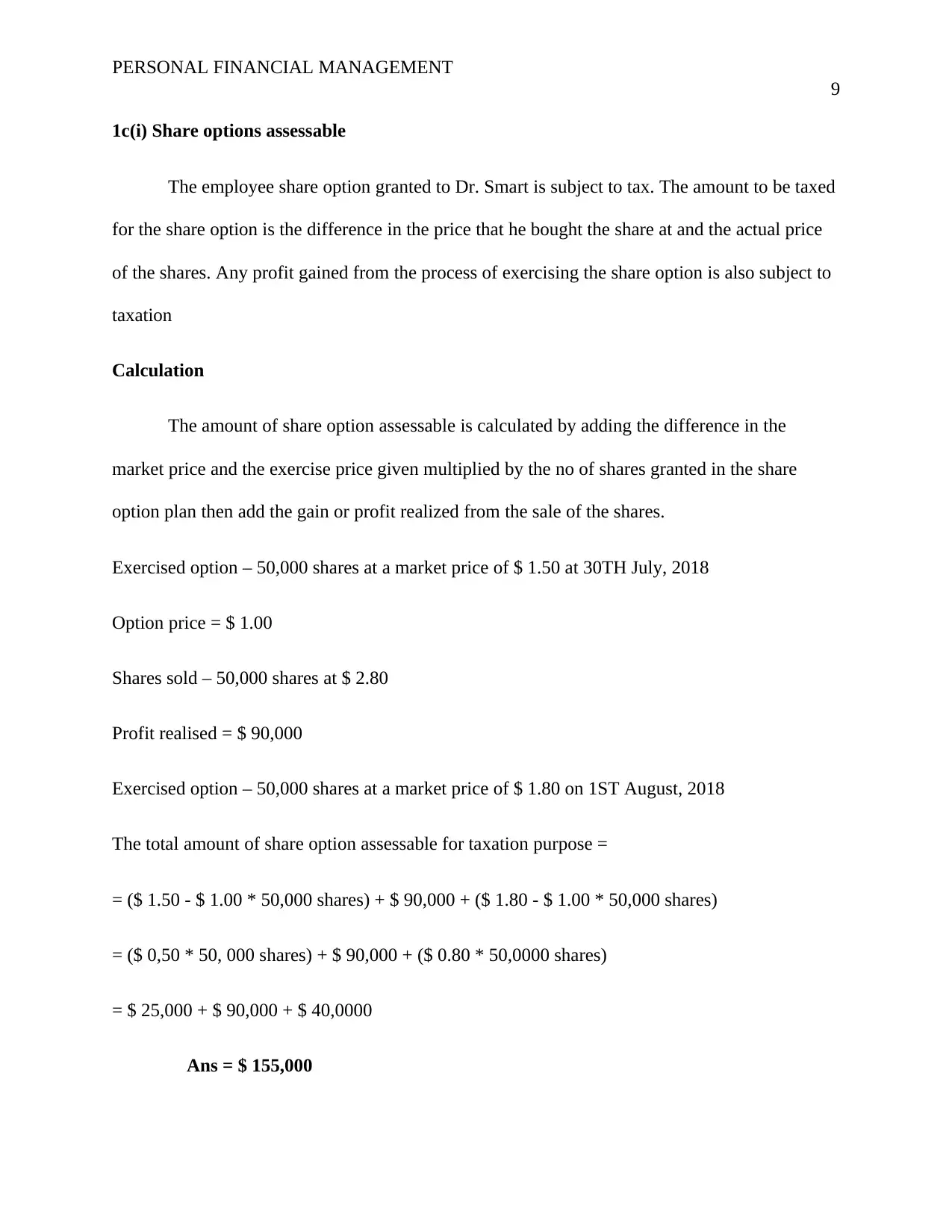
PERSONAL FINANCIAL MANAGEMENT
9
1c(i) Share options assessable
The employee share option granted to Dr. Smart is subject to tax. The amount to be taxed
for the share option is the difference in the price that he bought the share at and the actual price
of the shares. Any profit gained from the process of exercising the share option is also subject to
taxation
Calculation
The amount of share option assessable is calculated by adding the difference in the
market price and the exercise price given multiplied by the no of shares granted in the share
option plan then add the gain or profit realized from the sale of the shares.
Exercised option – 50,000 shares at a market price of $ 1.50 at 30TH July, 2018
Option price = $ 1.00
Shares sold – 50,000 shares at $ 2.80
Profit realised = $ 90,000
Exercised option – 50,000 shares at a market price of $ 1.80 on 1ST August, 2018
The total amount of share option assessable for taxation purpose =
= ($ 1.50 - $ 1.00 * 50,000 shares) + $ 90,000 + ($ 1.80 - $ 1.00 * 50,000 shares)
= ($ 0,50 * 50, 000 shares) + $ 90,000 + ($ 0.80 * 50,0000 shares)
= $ 25,000 + $ 90,000 + $ 40,0000
Ans = $ 155,000
9
1c(i) Share options assessable
The employee share option granted to Dr. Smart is subject to tax. The amount to be taxed
for the share option is the difference in the price that he bought the share at and the actual price
of the shares. Any profit gained from the process of exercising the share option is also subject to
taxation
Calculation
The amount of share option assessable is calculated by adding the difference in the
market price and the exercise price given multiplied by the no of shares granted in the share
option plan then add the gain or profit realized from the sale of the shares.
Exercised option – 50,000 shares at a market price of $ 1.50 at 30TH July, 2018
Option price = $ 1.00
Shares sold – 50,000 shares at $ 2.80
Profit realised = $ 90,000
Exercised option – 50,000 shares at a market price of $ 1.80 on 1ST August, 2018
The total amount of share option assessable for taxation purpose =
= ($ 1.50 - $ 1.00 * 50,000 shares) + $ 90,000 + ($ 1.80 - $ 1.00 * 50,000 shares)
= ($ 0,50 * 50, 000 shares) + $ 90,000 + ($ 0.80 * 50,0000 shares)
= $ 25,000 + $ 90,000 + $ 40,0000
Ans = $ 155,000
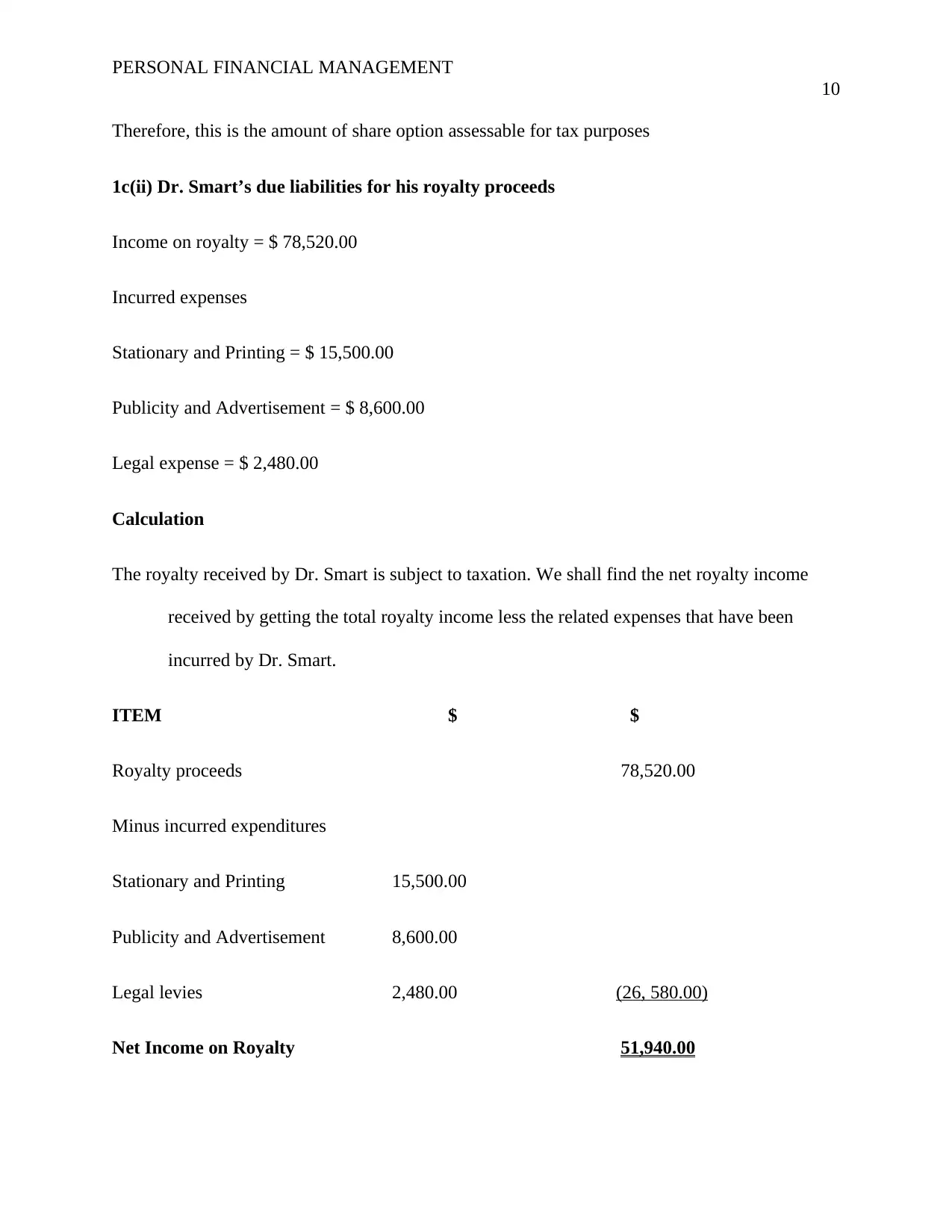
PERSONAL FINANCIAL MANAGEMENT
10
Therefore, this is the amount of share option assessable for tax purposes
1c(ii) Dr. Smart’s due liabilities for his royalty proceeds
Income on royalty = $ 78,520.00
Incurred expenses
Stationary and Printing = $ 15,500.00
Publicity and Advertisement = $ 8,600.00
Legal expense = $ 2,480.00
Calculation
The royalty received by Dr. Smart is subject to taxation. We shall find the net royalty income
received by getting the total royalty income less the related expenses that have been
incurred by Dr. Smart.
ITEM $ $
Royalty proceeds 78,520.00
Minus incurred expenditures
Stationary and Printing 15,500.00
Publicity and Advertisement 8,600.00
Legal levies 2,480.00 (26, 580.00)
Net Income on Royalty 51,940.00
10
Therefore, this is the amount of share option assessable for tax purposes
1c(ii) Dr. Smart’s due liabilities for his royalty proceeds
Income on royalty = $ 78,520.00
Incurred expenses
Stationary and Printing = $ 15,500.00
Publicity and Advertisement = $ 8,600.00
Legal expense = $ 2,480.00
Calculation
The royalty received by Dr. Smart is subject to taxation. We shall find the net royalty income
received by getting the total royalty income less the related expenses that have been
incurred by Dr. Smart.
ITEM $ $
Royalty proceeds 78,520.00
Minus incurred expenditures
Stationary and Printing 15,500.00
Publicity and Advertisement 8,600.00
Legal levies 2,480.00 (26, 580.00)
Net Income on Royalty 51,940.00
Secure Best Marks with AI Grader
Need help grading? Try our AI Grader for instant feedback on your assignments.
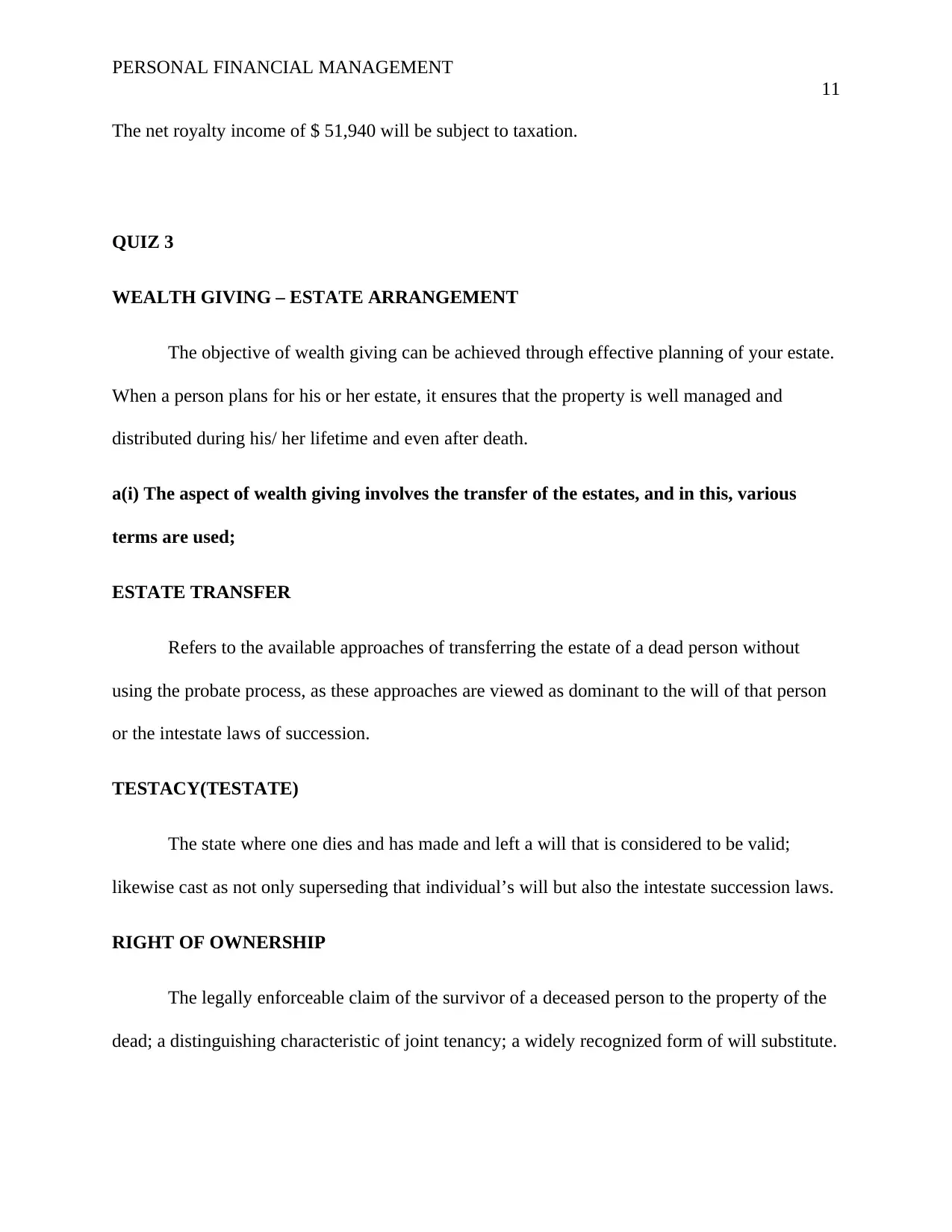
PERSONAL FINANCIAL MANAGEMENT
11
The net royalty income of $ 51,940 will be subject to taxation.
QUIZ 3
WEALTH GIVING – ESTATE ARRANGEMENT
The objective of wealth giving can be achieved through effective planning of your estate.
When a person plans for his or her estate, it ensures that the property is well managed and
distributed during his/ her lifetime and even after death.
a(i) The aspect of wealth giving involves the transfer of the estates, and in this, various
terms are used;
ESTATE TRANSFER
Refers to the available approaches of transferring the estate of a dead person without
using the probate process, as these approaches are viewed as dominant to the will of that person
or the intestate laws of succession.
TESTACY(TESTATE)
The state where one dies and has made and left a will that is considered to be valid;
likewise cast as not only superseding that individual’s will but also the intestate succession laws.
RIGHT OF OWNERSHIP
The legally enforceable claim of the survivor of a deceased person to the property of the
dead; a distinguishing characteristic of joint tenancy; a widely recognized form of will substitute.
11
The net royalty income of $ 51,940 will be subject to taxation.
QUIZ 3
WEALTH GIVING – ESTATE ARRANGEMENT
The objective of wealth giving can be achieved through effective planning of your estate.
When a person plans for his or her estate, it ensures that the property is well managed and
distributed during his/ her lifetime and even after death.
a(i) The aspect of wealth giving involves the transfer of the estates, and in this, various
terms are used;
ESTATE TRANSFER
Refers to the available approaches of transferring the estate of a dead person without
using the probate process, as these approaches are viewed as dominant to the will of that person
or the intestate laws of succession.
TESTACY(TESTATE)
The state where one dies and has made and left a will that is considered to be valid;
likewise cast as not only superseding that individual’s will but also the intestate succession laws.
RIGHT OF OWNERSHIP
The legally enforceable claim of the survivor of a deceased person to the property of the
dead; a distinguishing characteristic of joint tenancy; a widely recognized form of will substitute.
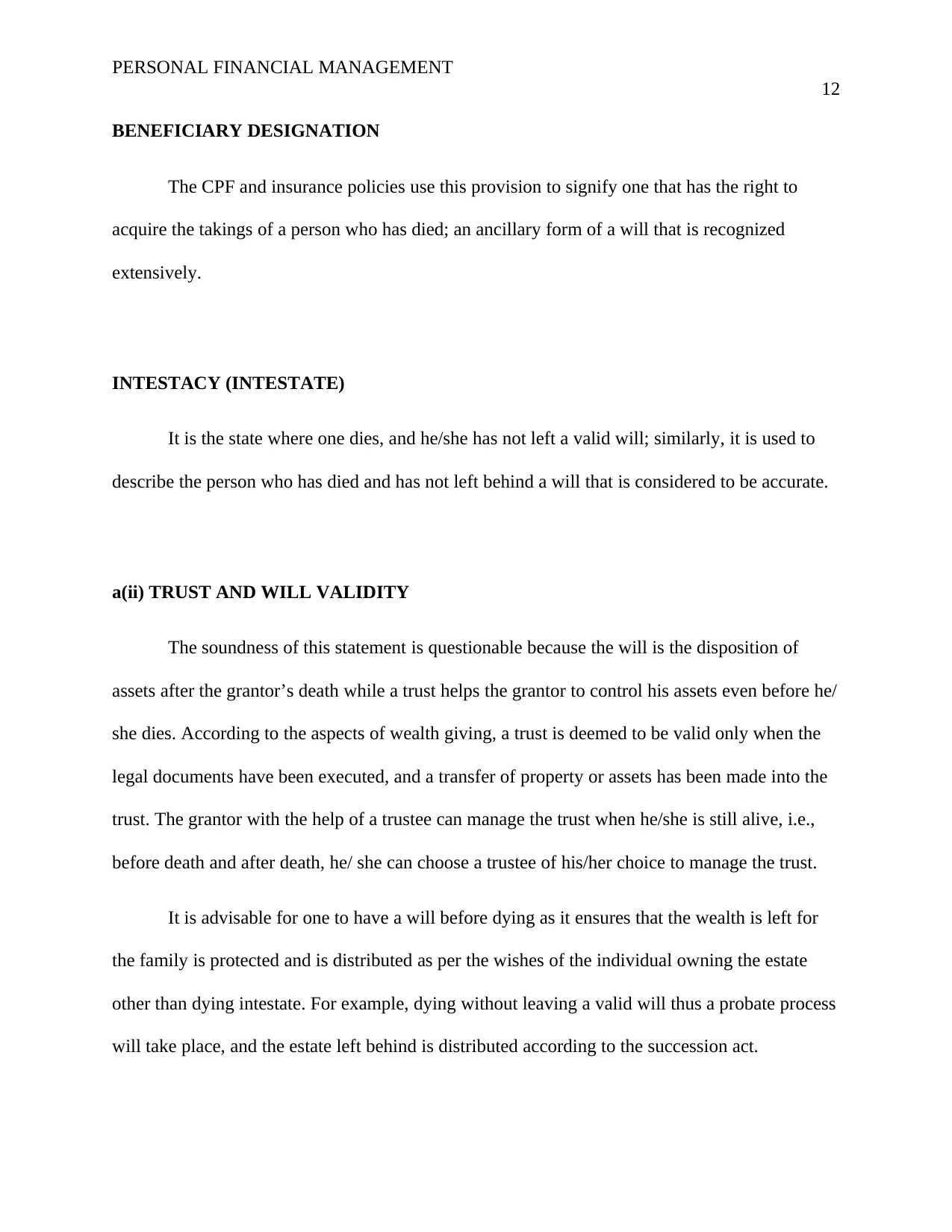
PERSONAL FINANCIAL MANAGEMENT
12
BENEFICIARY DESIGNATION
The CPF and insurance policies use this provision to signify one that has the right to
acquire the takings of a person who has died; an ancillary form of a will that is recognized
extensively.
INTESTACY (INTESTATE)
It is the state where one dies, and he/she has not left a valid will; similarly, it is used to
describe the person who has died and has not left behind a will that is considered to be accurate.
a(ii) TRUST AND WILL VALIDITY
The soundness of this statement is questionable because the will is the disposition of
assets after the grantor’s death while a trust helps the grantor to control his assets even before he/
she dies. According to the aspects of wealth giving, a trust is deemed to be valid only when the
legal documents have been executed, and a transfer of property or assets has been made into the
trust. The grantor with the help of a trustee can manage the trust when he/she is still alive, i.e.,
before death and after death, he/ she can choose a trustee of his/her choice to manage the trust.
It is advisable for one to have a will before dying as it ensures that the wealth is left for
the family is protected and is distributed as per the wishes of the individual owning the estate
other than dying intestate. For example, dying without leaving a valid will thus a probate process
will take place, and the estate left behind is distributed according to the succession act.
12
BENEFICIARY DESIGNATION
The CPF and insurance policies use this provision to signify one that has the right to
acquire the takings of a person who has died; an ancillary form of a will that is recognized
extensively.
INTESTACY (INTESTATE)
It is the state where one dies, and he/she has not left a valid will; similarly, it is used to
describe the person who has died and has not left behind a will that is considered to be accurate.
a(ii) TRUST AND WILL VALIDITY
The soundness of this statement is questionable because the will is the disposition of
assets after the grantor’s death while a trust helps the grantor to control his assets even before he/
she dies. According to the aspects of wealth giving, a trust is deemed to be valid only when the
legal documents have been executed, and a transfer of property or assets has been made into the
trust. The grantor with the help of a trustee can manage the trust when he/she is still alive, i.e.,
before death and after death, he/ she can choose a trustee of his/her choice to manage the trust.
It is advisable for one to have a will before dying as it ensures that the wealth is left for
the family is protected and is distributed as per the wishes of the individual owning the estate
other than dying intestate. For example, dying without leaving a valid will thus a probate process
will take place, and the estate left behind is distributed according to the succession act.
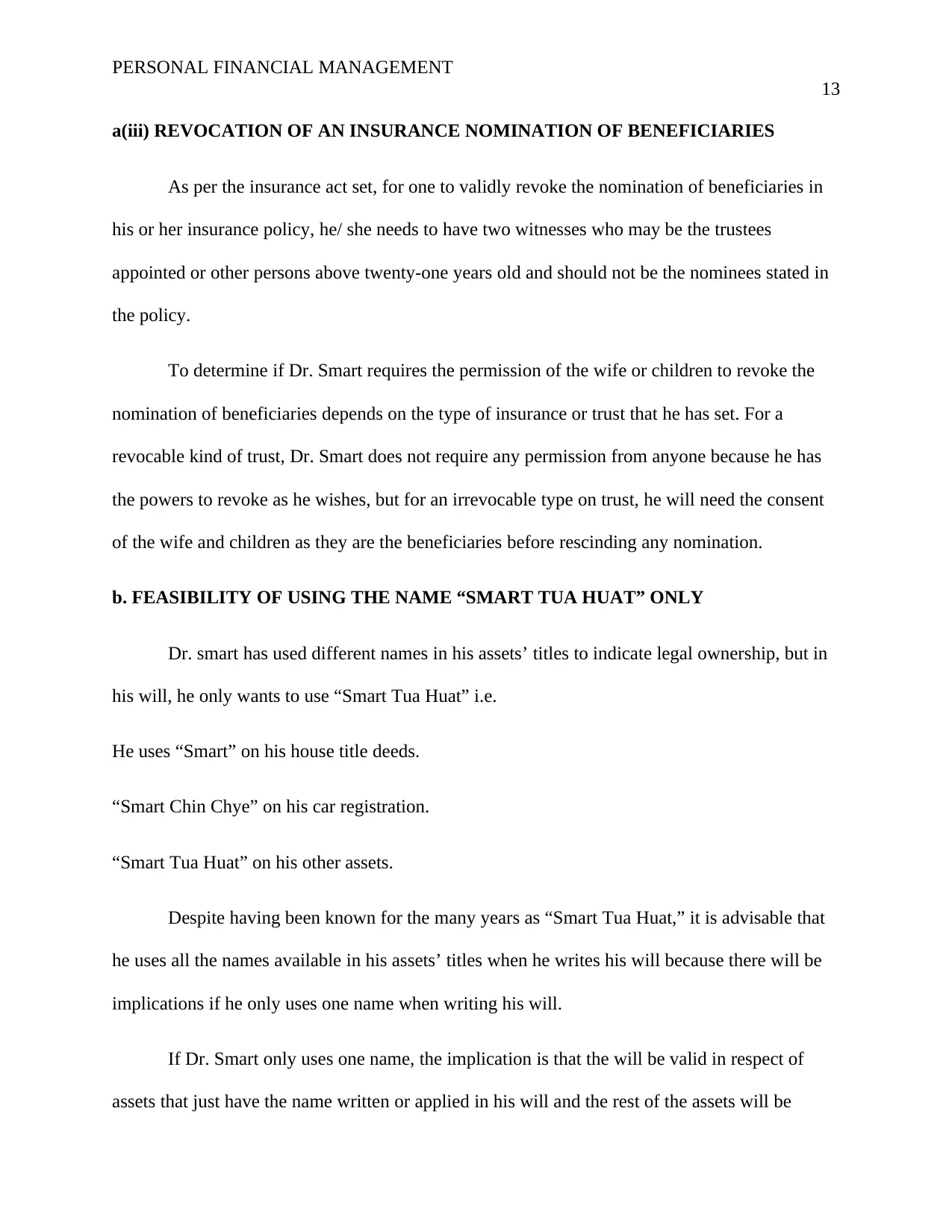
PERSONAL FINANCIAL MANAGEMENT
13
a(iii) REVOCATION OF AN INSURANCE NOMINATION OF BENEFICIARIES
As per the insurance act set, for one to validly revoke the nomination of beneficiaries in
his or her insurance policy, he/ she needs to have two witnesses who may be the trustees
appointed or other persons above twenty-one years old and should not be the nominees stated in
the policy.
To determine if Dr. Smart requires the permission of the wife or children to revoke the
nomination of beneficiaries depends on the type of insurance or trust that he has set. For a
revocable kind of trust, Dr. Smart does not require any permission from anyone because he has
the powers to revoke as he wishes, but for an irrevocable type on trust, he will need the consent
of the wife and children as they are the beneficiaries before rescinding any nomination.
b. FEASIBILITY OF USING THE NAME “SMART TUA HUAT” ONLY
Dr. smart has used different names in his assets’ titles to indicate legal ownership, but in
his will, he only wants to use “Smart Tua Huat” i.e.
He uses “Smart” on his house title deeds.
“Smart Chin Chye” on his car registration.
“Smart Tua Huat” on his other assets.
Despite having been known for the many years as “Smart Tua Huat,” it is advisable that
he uses all the names available in his assets’ titles when he writes his will because there will be
implications if he only uses one name when writing his will.
If Dr. Smart only uses one name, the implication is that the will be valid in respect of
assets that just have the name written or applied in his will and the rest of the assets will be
13
a(iii) REVOCATION OF AN INSURANCE NOMINATION OF BENEFICIARIES
As per the insurance act set, for one to validly revoke the nomination of beneficiaries in
his or her insurance policy, he/ she needs to have two witnesses who may be the trustees
appointed or other persons above twenty-one years old and should not be the nominees stated in
the policy.
To determine if Dr. Smart requires the permission of the wife or children to revoke the
nomination of beneficiaries depends on the type of insurance or trust that he has set. For a
revocable kind of trust, Dr. Smart does not require any permission from anyone because he has
the powers to revoke as he wishes, but for an irrevocable type on trust, he will need the consent
of the wife and children as they are the beneficiaries before rescinding any nomination.
b. FEASIBILITY OF USING THE NAME “SMART TUA HUAT” ONLY
Dr. smart has used different names in his assets’ titles to indicate legal ownership, but in
his will, he only wants to use “Smart Tua Huat” i.e.
He uses “Smart” on his house title deeds.
“Smart Chin Chye” on his car registration.
“Smart Tua Huat” on his other assets.
Despite having been known for the many years as “Smart Tua Huat,” it is advisable that
he uses all the names available in his assets’ titles when he writes his will because there will be
implications if he only uses one name when writing his will.
If Dr. Smart only uses one name, the implication is that the will be valid in respect of
assets that just have the name written or applied in his will and the rest of the assets will be
Paraphrase This Document
Need a fresh take? Get an instant paraphrase of this document with our AI Paraphraser
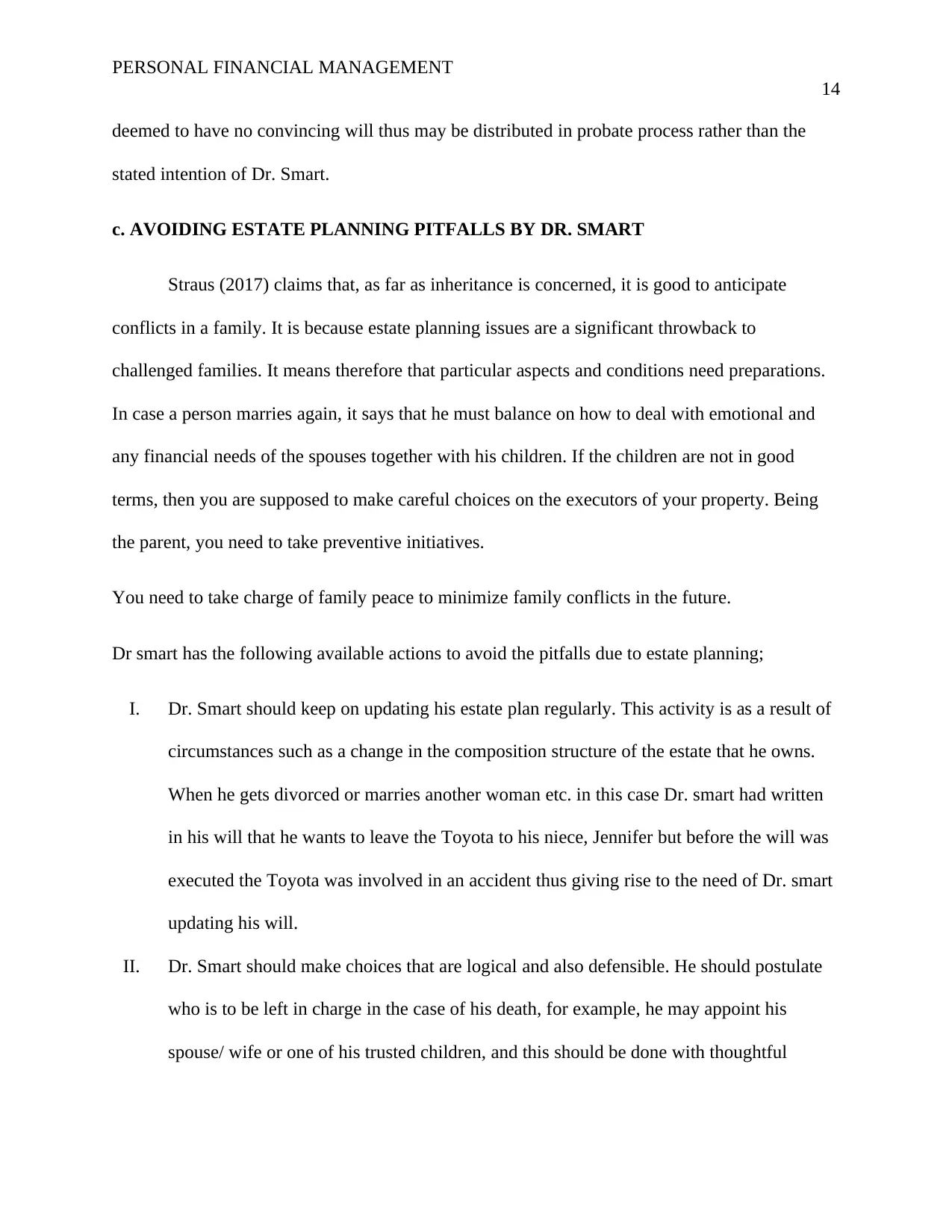
PERSONAL FINANCIAL MANAGEMENT
14
deemed to have no convincing will thus may be distributed in probate process rather than the
stated intention of Dr. Smart.
c. AVOIDING ESTATE PLANNING PITFALLS BY DR. SMART
Straus (2017) claims that, as far as inheritance is concerned, it is good to anticipate
conflicts in a family. It is because estate planning issues are a significant throwback to
challenged families. It means therefore that particular aspects and conditions need preparations.
In case a person marries again, it says that he must balance on how to deal with emotional and
any financial needs of the spouses together with his children. If the children are not in good
terms, then you are supposed to make careful choices on the executors of your property. Being
the parent, you need to take preventive initiatives.
You need to take charge of family peace to minimize family conflicts in the future.
Dr smart has the following available actions to avoid the pitfalls due to estate planning;
I. Dr. Smart should keep on updating his estate plan regularly. This activity is as a result of
circumstances such as a change in the composition structure of the estate that he owns.
When he gets divorced or marries another woman etc. in this case Dr. smart had written
in his will that he wants to leave the Toyota to his niece, Jennifer but before the will was
executed the Toyota was involved in an accident thus giving rise to the need of Dr. smart
updating his will.
II. Dr. Smart should make choices that are logical and also defensible. He should postulate
who is to be left in charge in the case of his death, for example, he may appoint his
spouse/ wife or one of his trusted children, and this should be done with thoughtful
14
deemed to have no convincing will thus may be distributed in probate process rather than the
stated intention of Dr. Smart.
c. AVOIDING ESTATE PLANNING PITFALLS BY DR. SMART
Straus (2017) claims that, as far as inheritance is concerned, it is good to anticipate
conflicts in a family. It is because estate planning issues are a significant throwback to
challenged families. It means therefore that particular aspects and conditions need preparations.
In case a person marries again, it says that he must balance on how to deal with emotional and
any financial needs of the spouses together with his children. If the children are not in good
terms, then you are supposed to make careful choices on the executors of your property. Being
the parent, you need to take preventive initiatives.
You need to take charge of family peace to minimize family conflicts in the future.
Dr smart has the following available actions to avoid the pitfalls due to estate planning;
I. Dr. Smart should keep on updating his estate plan regularly. This activity is as a result of
circumstances such as a change in the composition structure of the estate that he owns.
When he gets divorced or marries another woman etc. in this case Dr. smart had written
in his will that he wants to leave the Toyota to his niece, Jennifer but before the will was
executed the Toyota was involved in an accident thus giving rise to the need of Dr. smart
updating his will.
II. Dr. Smart should make choices that are logical and also defensible. He should postulate
who is to be left in charge in the case of his death, for example, he may appoint his
spouse/ wife or one of his trusted children, and this should be done with thoughtful
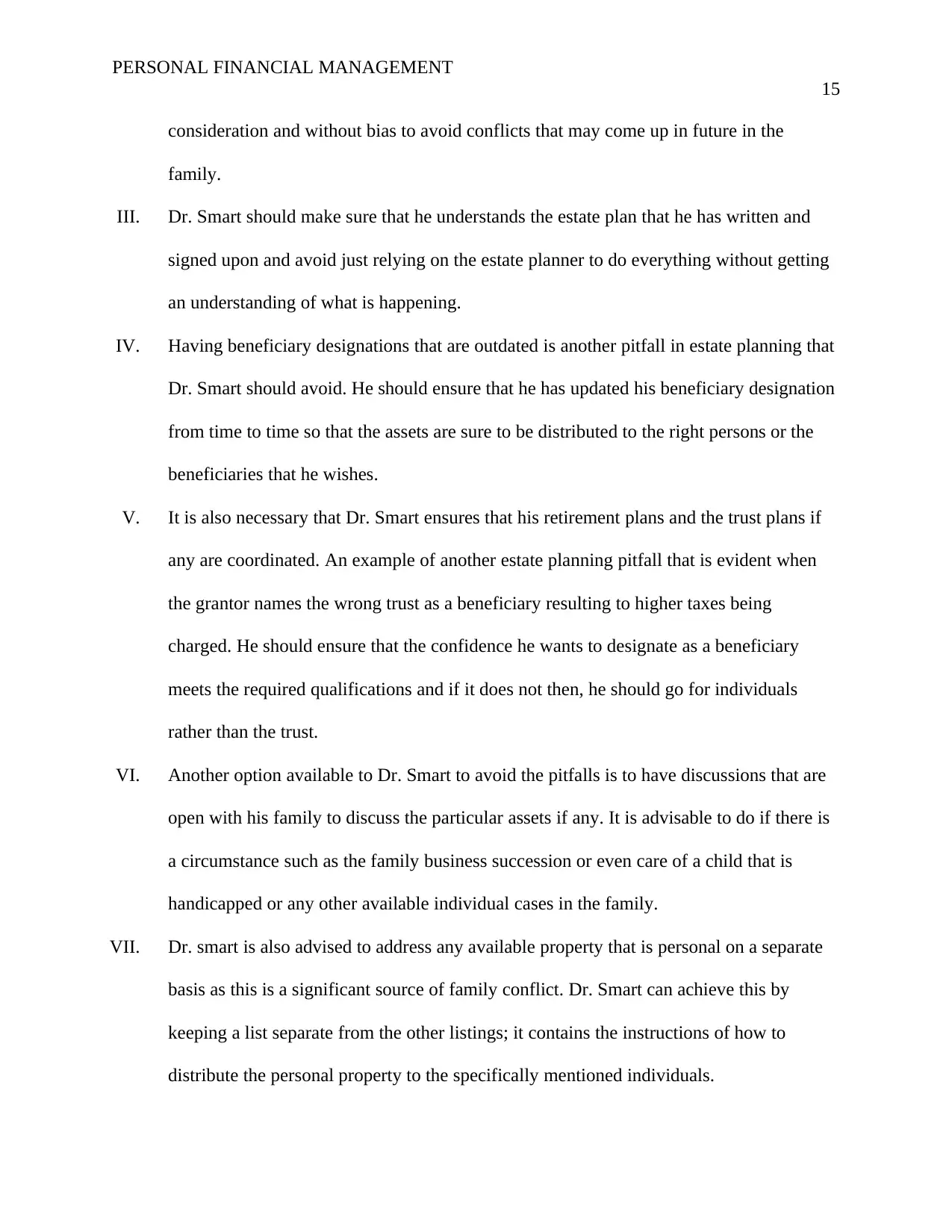
PERSONAL FINANCIAL MANAGEMENT
15
consideration and without bias to avoid conflicts that may come up in future in the
family.
III. Dr. Smart should make sure that he understands the estate plan that he has written and
signed upon and avoid just relying on the estate planner to do everything without getting
an understanding of what is happening.
IV. Having beneficiary designations that are outdated is another pitfall in estate planning that
Dr. Smart should avoid. He should ensure that he has updated his beneficiary designation
from time to time so that the assets are sure to be distributed to the right persons or the
beneficiaries that he wishes.
V. It is also necessary that Dr. Smart ensures that his retirement plans and the trust plans if
any are coordinated. An example of another estate planning pitfall that is evident when
the grantor names the wrong trust as a beneficiary resulting to higher taxes being
charged. He should ensure that the confidence he wants to designate as a beneficiary
meets the required qualifications and if it does not then, he should go for individuals
rather than the trust.
VI. Another option available to Dr. Smart to avoid the pitfalls is to have discussions that are
open with his family to discuss the particular assets if any. It is advisable to do if there is
a circumstance such as the family business succession or even care of a child that is
handicapped or any other available individual cases in the family.
VII. Dr. smart is also advised to address any available property that is personal on a separate
basis as this is a significant source of family conflict. Dr. Smart can achieve this by
keeping a list separate from the other listings; it contains the instructions of how to
distribute the personal property to the specifically mentioned individuals.
15
consideration and without bias to avoid conflicts that may come up in future in the
family.
III. Dr. Smart should make sure that he understands the estate plan that he has written and
signed upon and avoid just relying on the estate planner to do everything without getting
an understanding of what is happening.
IV. Having beneficiary designations that are outdated is another pitfall in estate planning that
Dr. Smart should avoid. He should ensure that he has updated his beneficiary designation
from time to time so that the assets are sure to be distributed to the right persons or the
beneficiaries that he wishes.
V. It is also necessary that Dr. Smart ensures that his retirement plans and the trust plans if
any are coordinated. An example of another estate planning pitfall that is evident when
the grantor names the wrong trust as a beneficiary resulting to higher taxes being
charged. He should ensure that the confidence he wants to designate as a beneficiary
meets the required qualifications and if it does not then, he should go for individuals
rather than the trust.
VI. Another option available to Dr. Smart to avoid the pitfalls is to have discussions that are
open with his family to discuss the particular assets if any. It is advisable to do if there is
a circumstance such as the family business succession or even care of a child that is
handicapped or any other available individual cases in the family.
VII. Dr. smart is also advised to address any available property that is personal on a separate
basis as this is a significant source of family conflict. Dr. Smart can achieve this by
keeping a list separate from the other listings; it contains the instructions of how to
distribute the personal property to the specifically mentioned individuals.
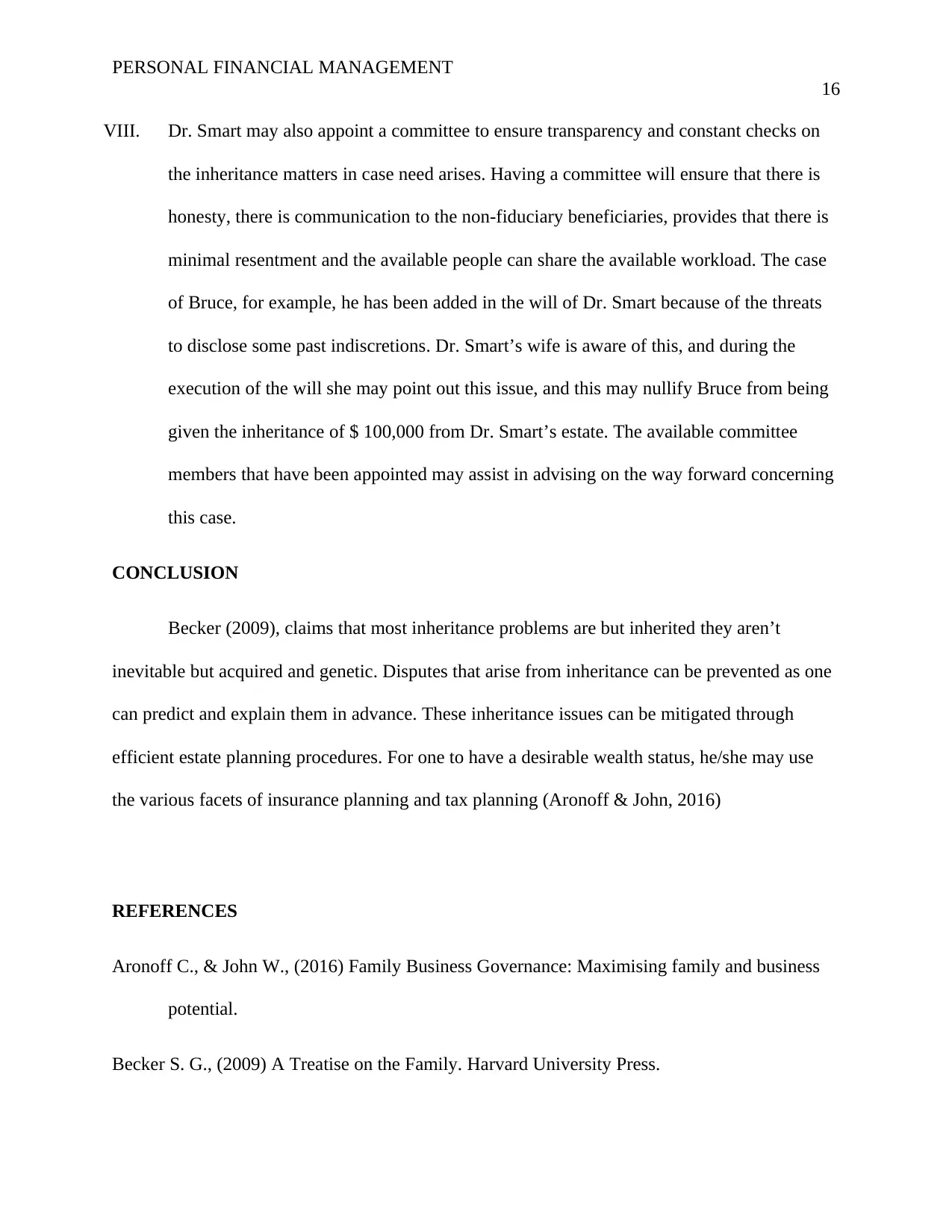
PERSONAL FINANCIAL MANAGEMENT
16
VIII. Dr. Smart may also appoint a committee to ensure transparency and constant checks on
the inheritance matters in case need arises. Having a committee will ensure that there is
honesty, there is communication to the non-fiduciary beneficiaries, provides that there is
minimal resentment and the available people can share the available workload. The case
of Bruce, for example, he has been added in the will of Dr. Smart because of the threats
to disclose some past indiscretions. Dr. Smart’s wife is aware of this, and during the
execution of the will she may point out this issue, and this may nullify Bruce from being
given the inheritance of $ 100,000 from Dr. Smart’s estate. The available committee
members that have been appointed may assist in advising on the way forward concerning
this case.
CONCLUSION
Becker (2009), claims that most inheritance problems are but inherited they aren’t
inevitable but acquired and genetic. Disputes that arise from inheritance can be prevented as one
can predict and explain them in advance. These inheritance issues can be mitigated through
efficient estate planning procedures. For one to have a desirable wealth status, he/she may use
the various facets of insurance planning and tax planning (Aronoff & John, 2016)
REFERENCES
Aronoff C., & John W., (2016) Family Business Governance: Maximising family and business
potential.
Becker S. G., (2009) A Treatise on the Family. Harvard University Press.
16
VIII. Dr. Smart may also appoint a committee to ensure transparency and constant checks on
the inheritance matters in case need arises. Having a committee will ensure that there is
honesty, there is communication to the non-fiduciary beneficiaries, provides that there is
minimal resentment and the available people can share the available workload. The case
of Bruce, for example, he has been added in the will of Dr. Smart because of the threats
to disclose some past indiscretions. Dr. Smart’s wife is aware of this, and during the
execution of the will she may point out this issue, and this may nullify Bruce from being
given the inheritance of $ 100,000 from Dr. Smart’s estate. The available committee
members that have been appointed may assist in advising on the way forward concerning
this case.
CONCLUSION
Becker (2009), claims that most inheritance problems are but inherited they aren’t
inevitable but acquired and genetic. Disputes that arise from inheritance can be prevented as one
can predict and explain them in advance. These inheritance issues can be mitigated through
efficient estate planning procedures. For one to have a desirable wealth status, he/she may use
the various facets of insurance planning and tax planning (Aronoff & John, 2016)
REFERENCES
Aronoff C., & John W., (2016) Family Business Governance: Maximising family and business
potential.
Becker S. G., (2009) A Treatise on the Family. Harvard University Press.
Secure Best Marks with AI Grader
Need help grading? Try our AI Grader for instant feedback on your assignments.
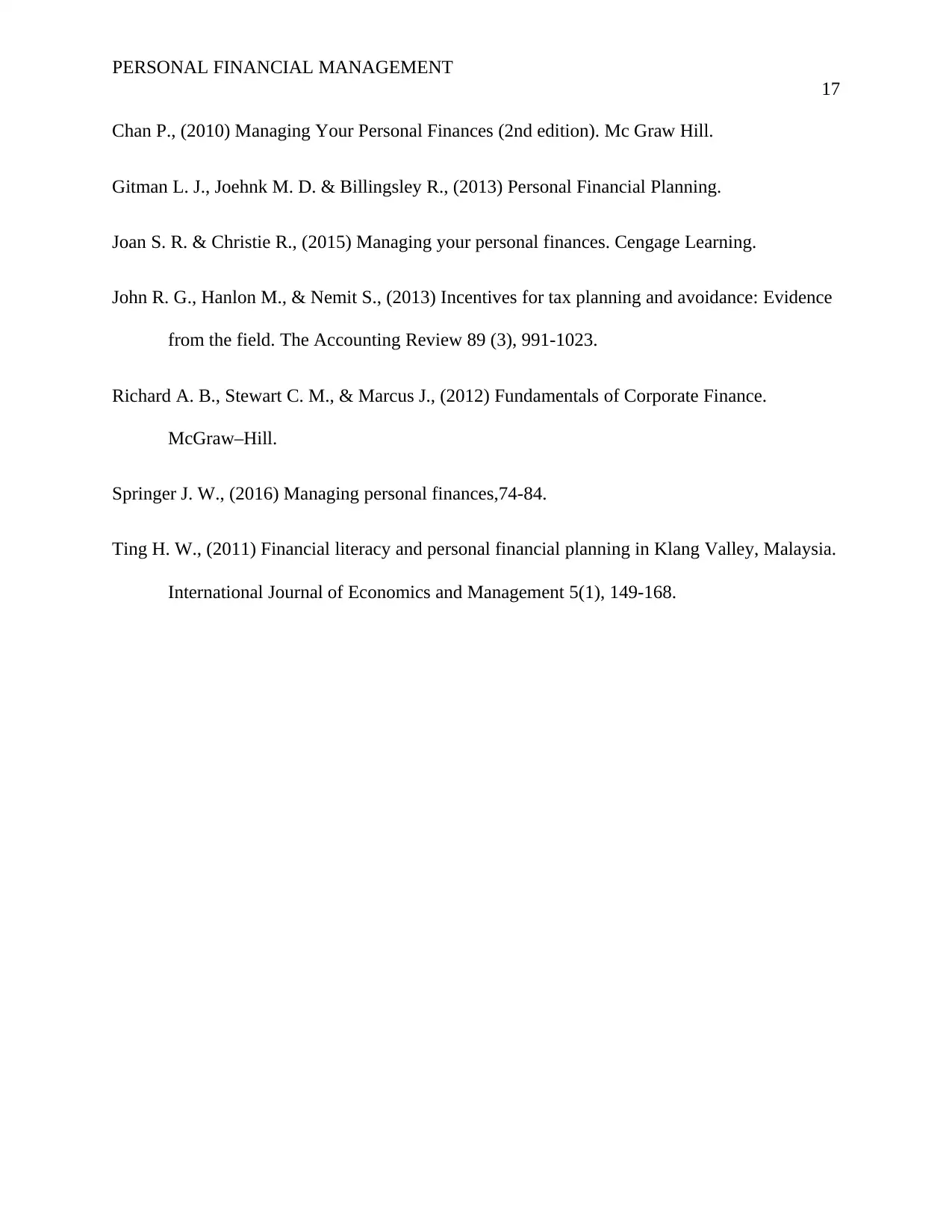
PERSONAL FINANCIAL MANAGEMENT
17
Chan P., (2010) Managing Your Personal Finances (2nd edition). Mc Graw Hill.
Gitman L. J., Joehnk M. D. & Billingsley R., (2013) Personal Financial Planning.
Joan S. R. & Christie R., (2015) Managing your personal finances. Cengage Learning.
John R. G., Hanlon M., & Nemit S., (2013) Incentives for tax planning and avoidance: Evidence
from the field. The Accounting Review 89 (3), 991-1023.
Richard A. B., Stewart C. M., & Marcus J., (2012) Fundamentals of Corporate Finance.
McGraw–Hill.
Springer J. W., (2016) Managing personal finances,74-84.
Ting H. W., (2011) Financial literacy and personal financial planning in Klang Valley, Malaysia.
International Journal of Economics and Management 5(1), 149-168.
17
Chan P., (2010) Managing Your Personal Finances (2nd edition). Mc Graw Hill.
Gitman L. J., Joehnk M. D. & Billingsley R., (2013) Personal Financial Planning.
Joan S. R. & Christie R., (2015) Managing your personal finances. Cengage Learning.
John R. G., Hanlon M., & Nemit S., (2013) Incentives for tax planning and avoidance: Evidence
from the field. The Accounting Review 89 (3), 991-1023.
Richard A. B., Stewart C. M., & Marcus J., (2012) Fundamentals of Corporate Finance.
McGraw–Hill.
Springer J. W., (2016) Managing personal finances,74-84.
Ting H. W., (2011) Financial literacy and personal financial planning in Klang Valley, Malaysia.
International Journal of Economics and Management 5(1), 149-168.
1 out of 17
Related Documents
Your All-in-One AI-Powered Toolkit for Academic Success.
+13062052269
info@desklib.com
Available 24*7 on WhatsApp / Email
![[object Object]](/_next/static/media/star-bottom.7253800d.svg)
Unlock your academic potential
© 2024 | Zucol Services PVT LTD | All rights reserved.




